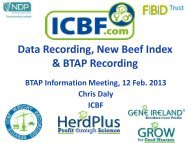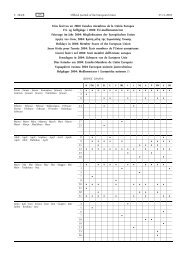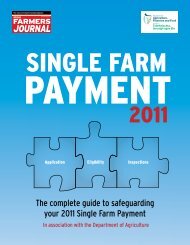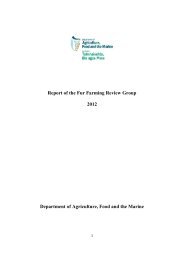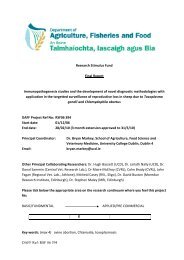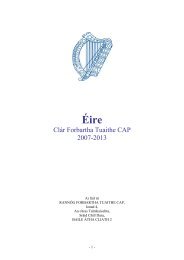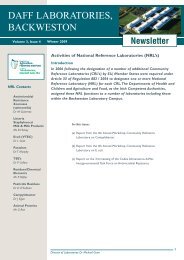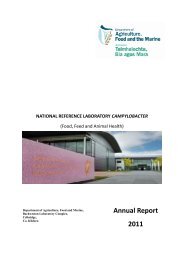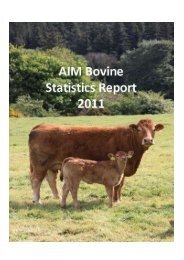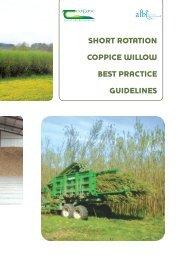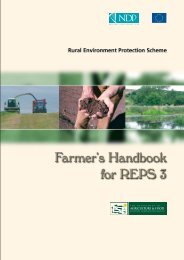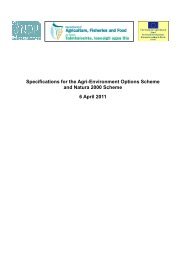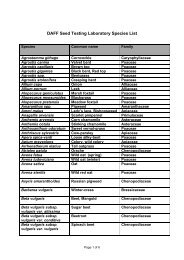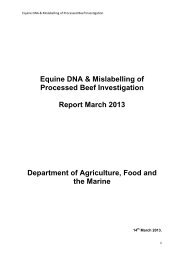Food Research Ireland - Department of Agriculture
Food Research Ireland - Department of Agriculture
Food Research Ireland - Department of Agriculture
You also want an ePaper? Increase the reach of your titles
YUMPU automatically turns print PDFs into web optimized ePapers that Google loves.
An important output <strong>of</strong> funding research through national research<br />
programmes is the ability to internationalise our national research<br />
capacity. <strong>Research</strong>ers who have developed competency under national<br />
funding programmes are expected to continuously engage with<br />
international consortia and leverage additional funding to augment their<br />
research activities. However, <strong>Ireland</strong> must continue to identify<br />
opportunities for further international collaboration with regard to food<br />
research. In doing so, <strong>Ireland</strong> can leverage additional resources that will<br />
not only strengthen the national capacity but will also ensure that our<br />
research is not only in line with international standards but in some cases<br />
can lead the international science.<br />
North South co-operation – there is significant political-will in both parts<br />
<strong>of</strong> the island to advance collaboration with regard to funding research,<br />
however, at funding body level engagement is poor. As an initial phase<br />
it may be appropriate to develop key collaborations in certain mutually<br />
agreed priority areas in order to develop the processes and<br />
methodologies for further collaboration on an ongoing basis. The fact<br />
that <strong>Ireland</strong> adopts an all island approach to FP7 could be used as sound<br />
rationale for such a joined up strategy. In order to make such an<br />
arrangement it is important that contacts are established at a high level.<br />
Currently, DAFM, through their competitive research programmes have<br />
funded research consortia which include partners from RPO’s in<br />
Northern <strong>Ireland</strong>. In addition, Safefood consistently funds projects on an<br />
all-island basis. It is important to develop further the North-South<br />
collaboration in research.<br />
International Agreements - DAFM already have experience <strong>of</strong> such<br />
international agreements through its Memoranda <strong>of</strong> Understanding<br />
(MOU) in food research with the USDA and the FDA. Consideration<br />
should be given to entering into discussions with other significant<br />
international research players with a view, possibly, to agreeing other<br />
MOU’s. This could be achieved by DAFM re-examining the relationship<br />
with USDA and FDA and look to develop further mutually beneficial<br />
relationships. To date there has been some engagement with Finland<br />
and The Netherlands which merit further consideration. As a starting<br />
point, research agreements between Irish RPO’s and their international<br />
counterparts should be examined to determine the most appropriate<br />
countries with whom we should cob-operate. European <strong>Research</strong> Area<br />
Networks (ERANETs) and other EU programmes could provide the<br />
opportunity for developing such cross border relationships.<br />
International <strong>Research</strong> Funding - The successful implementation <strong>of</strong> <strong>Food</strong><br />
<strong>Research</strong> <strong>Ireland</strong> requires excellent research and excellent researchers.<br />
The EU’s 7th Framework Programme 35 <strong>of</strong>fers Irish researchers the<br />
opportunity to work with and be the best in Europe and to showcase<br />
our research excellence.<br />
<strong>Ireland</strong>’s involvement in international research is a central component in<br />
the development <strong>of</strong> a knowledge economy. Over the course <strong>of</strong> the past<br />
10 years there has been considerable investment by the Irish<br />
Government in building national research capacity, capability and critical<br />
mass. Our stated objectives <strong>of</strong> internationalisation and the importance<br />
<strong>of</strong> collaboration with other researchers outside <strong>of</strong> <strong>Ireland</strong> will require<br />
researchers who have attracted considerable national investment to<br />
advance and develop international research collaborations. Indeed,<br />
many Irish researchers have been successful in attracting international<br />
funds from the EU Framework Programme, National Institute <strong>of</strong> Health<br />
in the USA and others. However, additional funds can be leveraged.<br />
35 The Seventh EU Framework Programme (FP7) for research and technological development is the European Union’s main instrument for funding research in Europe. The programme is set to run from 2007 to<br />
2013 and has a budget <strong>of</strong> €53.2bn over its seven-year lifespan with €1.9bn dedicated to research in the food, agricultural, fisheries and biotechnological theme area. FP7 has 4 main elements: Cooperation; Ideas;<br />
People and Capacities. Further details are available on www.fp7ireland.com. Irish researchers in the agri-food sector focus mainly on Cooperation Theme 2: '<strong>Food</strong>, <strong>Agriculture</strong> and Fisheries, and Biotechnology'<br />
(FAFB) for funding. This theme is built around three major activities:<br />
• Sustainable production and management <strong>of</strong> biological resources from land, forest and aquatic environments;<br />
• Fork to farm: <strong>Food</strong> (including seafood), health and well-being;<br />
• Life sciences, biotechnology and biochemistry for sustainable non-food products and processes.<br />
<strong>Food</strong> <strong>Research</strong> <strong>Ireland</strong><br />
▼<br />
50<br />
2



